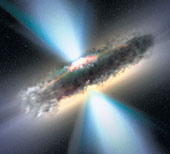 |
A problem that has flummoxed physicists for some 40 years has just turned nastier. At least two generations of them have been struggling to come to terms with a scary possibility — that information can be lost forever. It isn’t like a worm cleaning out computer files or a teenage love note being shredded. Instead, it’s the complete obliteration of information from this universe.
And that’s something the laws of physics just don’t allow.
Cornered, physicists had conjured up three escape routes that had whittled down to one because two of them turned out to be even more blasphemous. Now physicists Arun Pati at the Institute of Physics in Bhubaneswar and Samuel Braunstein at York University in the UK have all but closed the final one. But in doing that, they may well have bolstered the hopes of believers in parallel universes.
In their work, the physicists are asking their colleagues around the world to make a choice: trash quantum mechanics which most will argue is among the most successful descriptions of the world ever developed, or agree that there are fatal flaws in the Cambridge, UK, physicist Stephen Hawking’s much-respected prediction of the long-term fate of the exotic black holes — objects with such intense gravity that not even light can escape from them.
“Our results suggest that either quantum mechanics or Hawking’s analysis must break down,” said Pati who’s among physicists worldwide trying to fathom the meaning of quantum mechanics — a rather queer, mathematically rigorous but dramatically successful way of describing nature, but which has a habit of spewing results that are baffling to the human mind.
The information loss paradox — as physicists call the problem — emerged in the 1970s when Hawking showed that black holes can evaporate away in a steady stream of featureless radiation that contains no information. But that prediction hurled physicists into a new dilemma — what happens to all the information that the black hole had consumed as it swallowed up matter and light?
 |
| Arun Pati of the Institute of Physics in Bhubaneswar (right) and Samuel Braunstein of York University, UK, may well have bolstered the hopes of believers in parallel universes |
“When a black hole does not return any information about the detailed states of matter that has gone into it, the original information disappears. But our laws of physics say that information should be preserved,” Pati said.
Over the decades, some physicists have suggested that while black hole radiation has no features, the information may emerge at a later time. But others have proposed the information may be retained in a ‘residue’ of the black hole — a tiny speck in space left behind by the evaporated black hole.
“But either one of these two options would lead to a disaster for quantum mechanics,” said Braunstein, who’s at the department of computer sciences at York University.
There was a third option consistent with both quantum mechanics and Hawking’s analysis — that the information is held neither in the Hawking radiation nor inside the black hole but hides between the radiation and the black hole’s internal state — mysterious as it may be.
Hidden information is ubiquitous — in cryptography, for example. When a message is encoded through an encryption key, the original information is found neither in the coded text nor in the key. Instead, all the information is hidden in ‘correlations’ — the encryption rules that link the key to the coded text.
Braunstein and Pati who’ve collaborated for several years have shown that information following the laws of quantum mechanics cannot lie hidden in such correlations.
In a paper just published in an issue of the journal Physical Review Letters, the two physicists have derived a ‘no-hiding theorem’ for quantum information.
By closing this possible solution, they’ve questioned the very theories they started out with — one out of quantum mechanics or Hawking’s analysis, they say, must be wrong.
While their work does not indicate which one is wrong, it also offers no clue as to where the information may have gone.
“If quantum information disappears from the black hole — as Hawking’s initial analysis had suggested — it must have moved somewhere else. But no one knows where it goes,” said Braunstein.
Most physicists would cringe to discuss the innards of black holes — it’s a zone where all laws of physics appear to break down. But some have suggested — much to the thrill of science fiction fans — that a black hole may be a gateway into a parallel universe.
The work by Braunstein and Pati points to the need for new physics — where, just maybe, parallel universes may be a reality. “New physics could change this situation — concepts like parallel universes, a failure of Hawking’s calculation — which of these is correct we can’t say. All we know is that the pieces don’t add up,” Braunstein said.
The physicists claim the no-hiding theorem extends beyond black holes.
It could also have implications for quantum computation which promises faster and more efficient computers or quantum teleportation — a concept that has leapt out of science fiction into laboratories over the past decade.
Yet it’s the information paradox that physicists rate among their most vexing problems. Hawking himself attempted to address the issue in a research paper two years ago where he argued that black holes may give out information in an “unreadable form” like a book burnt into ashes. But this idea isn’t yet accepted widely by the physics community.
Braunstein and Pati may also have a hard time convincing their peers about the significance of their work. “We’ve been living with the information paradox for decades, and we’ve always known there’s a need for new physics,” said C.S. Unnikrishnan, a senior scientist at the Tata Institute of Fundamental Research in Mumbai. “I think this is a restrictive result based on assumptions that the emerging black hole radiation is independent of what went in and that information is truly absent from that radiation,” he said.
Instead, he suggests another possible solution — perhaps radiation coming out of the black hole contains closely packed information so large that individual components are impossible to discern.
But then disagreements on the information paradox aren’t new. Hawking two years ago admitted he had lost a bet to a fellow particle physicist on the question of information in black holes. If Pati and Braunstein are correct, Hawking may stand corrected once again.











